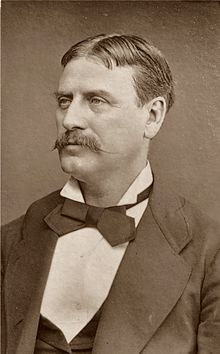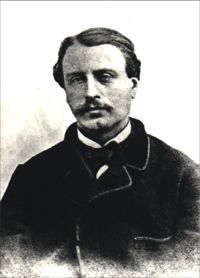Hervé (composer)

A woodburytype of Hervé
Louis-Auguste Florimond Ronger (30 June 1825 – 4 November 1892),librettist, conductor and scene painter, whom Ernest Newman, following Reynaldo Hahn, credited with inventing the genre of operetta in Paris.[2]
Life
Hervé was born in
Church of Saint-Eustache, while he doubled with his theatrical music career, a situation that he turned to advantage years later, in his most famous work, Mam'zelle Nitouche
.
Before he became
Desiré, who was short and plump, accompanied by the tall and gangling Hervé, as he was now calling himself, in order to distance his two personas. It was staged at Adolphe Adam's Opéra-National, and achieved a great success in 1848, in spite of the distracting revolution: furthermore, according to the composer Reynaldo Hahn, the farcical pot-pourri was "simply the first French operetta".[3] He had also composed musical entertainments to keep the patients entertained at the Bicêtre Hospital, and these gained the notice of producers.[4]
Thus, Hervé was the founder of a new era of French operettas. Through his
Orphée aux enfers
.
He died in Paris at the age of 67.
Since 2015, a number of his works have been revived by
Palazzetto Bru Zane in tours of France and Italy.[5]

Works
Hervé wrote more than a hundred and twenty operettas,[6] among which were:
- Les folies dramatiques (1853), with two other librettists, which parodied all the forms of entertainment in Paris, comedy, tragedy, vaudeville, ballet and opera.
- Bouffes Parisiens, 17 November 1866)
- L'œil crevé (Folies-Dramatiques, 12 October 1867)[7]
- Chilpéric (1868)
- Le petit Faust (1869)[8]
- Les Turcs (1869)
- Le trône d'Écosse (1871)
- La veuve du Malabar (1873)
- La belle poule (1875)
- La roussotte (with Charles Lecocq and Marius Boullard, Théâtre des Variétés, 1881)
- Lili (1882)
- Mam'zelle Nitouche (1883)
References
- ^ This article incorporates material translated from its German Wikipedia equivalent and is supplemented by the account of Hervé's career in Richard Traubner, Operetta: A Theatrical History 2003:20ff
- ^ Ernest Newman, in Louis Biancolli, ed. The Opera Reader (New York: McGraw-Hill) 1953:317.
- ^ Quoted with reservations, for the term had already been used, by Traubner 2003:20.
- ^ Lubbock, Mark. "The Music of 'Musicals'". The Musical Times, Vol. 98, No. 1375 (September, 1957), pp. 483–85, Musical Times Publications Ltd., accessed 17 August 2010
- ^ "Palazzetto Bru Zane: "Let's Talk About Hervé!"". Operetta Research Center. 2 February 2016. Retrieved 12 January 2019.
- ^ Taubner 2003.
- ^ Richard Traubner, Operetta: A Theatrical History 2003:22. It was produced in New York in 1868, at J. Grau's Theatre Français, as The Pierced Eye and its libretto published. It was a success too in Vienna and in London.
- ^ Information about Little Faust on Broadway
External links
Wikimedia Commons has media related to Hervé (composer).
- Hervé at IMDb
- Free scores by Hervé at the International Music Score Library Project (IMSLP)
- List of works by Hervé at the Index to Opera and Ballet Sources Online
